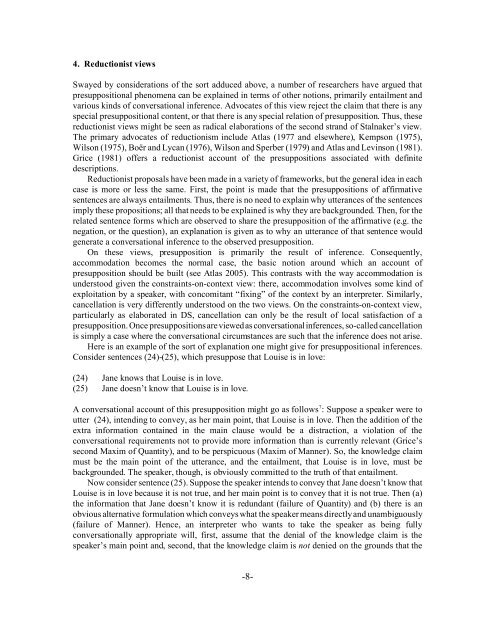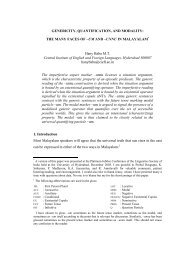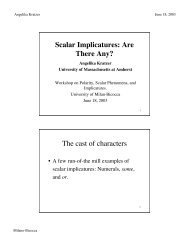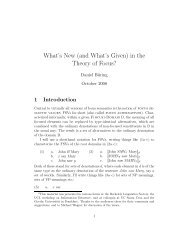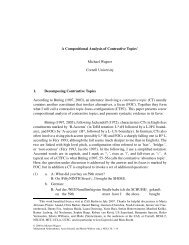Foundational Issues in Presupposition - New York University
Foundational Issues in Presupposition - New York University
Foundational Issues in Presupposition - New York University
Create successful ePaper yourself
Turn your PDF publications into a flip-book with our unique Google optimized e-Paper software.
4. Reductionist views<br />
Swayed by considerations of the sort adduced above, a number of researchers have argued that<br />
presuppositional phenomena can be expla<strong>in</strong>ed <strong>in</strong> terms of other notions, primarily entailment and<br />
various k<strong>in</strong>ds of conversational <strong>in</strong>ference. Advocates of this view reject the claim that there is any<br />
special presuppositional content, or that there is any special relation of presupposition. Thus, these<br />
reductionist views might be seen as radical elaborations of the second strand of Stalnaker’s view.<br />
The primary advocates of reductionism <strong>in</strong>clude Atlas (1977 and elsewhere), Kempson (1975),<br />
Wilson (1975), Boër and Lycan (1976), Wilson and Sperber (1979) and Atlas and Lev<strong>in</strong>son (1981).<br />
Grice (1981) offers a reductionist account of the presuppositions associated with def<strong>in</strong>ite<br />
descriptions.<br />
Reductionist proposals have been made <strong>in</strong> a variety of frameworks, but the general idea <strong>in</strong> each<br />
case is more or less the same. First, the po<strong>in</strong>t is made that the presuppositions of affirmative<br />
sentences are always entailments. Thus, there is no need to expla<strong>in</strong> why utterances of the sentences<br />
imply these propositions; all that needs to be expla<strong>in</strong>ed is why they are backgrounded. Then, for the<br />
related sentence forms which are observed to share the presupposition of the affirmative (e.g. the<br />
negation, or the question), an explanation is given as to why an utterance of that sentence would<br />
generate a conversational <strong>in</strong>ference to the observed presupposition.<br />
On these views, presupposition is primarily the result of <strong>in</strong>ference. Consequently,<br />
accommodation becomes the normal case, the basic notion around which an account of<br />
presupposition should be built (see Atlas 2005). This contrasts with the way accommodation is<br />
understood given the constra<strong>in</strong>ts-on-context view: there, accommodation <strong>in</strong>volves some k<strong>in</strong>d of<br />
exploitation by a speaker, with concomitant “fix<strong>in</strong>g” of the context by an <strong>in</strong>terpreter. Similarly,<br />
cancellation is very differently understood on the two views. On the constra<strong>in</strong>ts-on-context view,<br />
particularly as elaborated <strong>in</strong> DS, cancellation can only be the result of local satisfaction of a<br />
presupposition. Once presuppositions are viewed as conversational <strong>in</strong>ferences, so-called cancellation<br />
is simply a case where the conversational circumstances are such that the <strong>in</strong>ference does not arise.<br />
Here is an example of the sort of explanation one might give for presuppositional <strong>in</strong>ferences.<br />
Consider sentences (24)-(25), which presuppose that Louise is <strong>in</strong> love:<br />
(24) Jane knows that Louise is <strong>in</strong> love.<br />
(25) Jane doesn’t know that Louise is <strong>in</strong> love.<br />
A conversational account of this presupposition might go as follows 7 : Suppose a speaker were to<br />
utter (24), <strong>in</strong>tend<strong>in</strong>g to convey, as her ma<strong>in</strong> po<strong>in</strong>t, that Louise is <strong>in</strong> love. Then the addition of the<br />
extra <strong>in</strong>formation conta<strong>in</strong>ed <strong>in</strong> the ma<strong>in</strong> clause would be a distraction, a violation of the<br />
conversational requirements not to provide more <strong>in</strong>formation than is currently relevant (Grice’s<br />
second Maxim of Quantity), and to be perspicuous (Maxim of Manner). So, the knowledge claim<br />
must be the ma<strong>in</strong> po<strong>in</strong>t of the utterance, and the entailment, that Louise is <strong>in</strong> love, must be<br />
backgrounded. The speaker, though, is obviously committed to the truth of that entailment.<br />
Now consider sentence (25). Suppose the speaker <strong>in</strong>tends to convey that Jane doesn’t know that<br />
Louise is <strong>in</strong> love because it is not true, and her ma<strong>in</strong> po<strong>in</strong>t is to convey that it is not true. Then (a)<br />
the <strong>in</strong>formation that Jane doesn’t know it is redundant (failure of Quantity) and (b) there is an<br />
obvious alternative formulation which conveys what the speaker means directly and unambiguously<br />
(failure of Manner). Hence, an <strong>in</strong>terpreter who wants to take the speaker as be<strong>in</strong>g fully<br />
conversationally appropriate will, first, assume that the denial of the knowledge claim is the<br />
speaker’s ma<strong>in</strong> po<strong>in</strong>t and, second, that the knowledge claim is not denied on the grounds that the<br />
-8-


